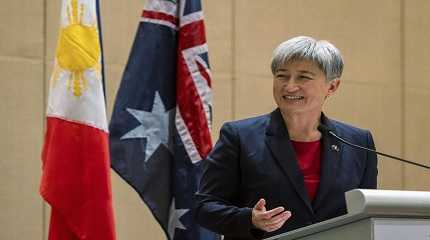
MANILA, Philippines (AP) — Australia will provide surveillance drones and other high-tech gear to the Philippine coast guard and is considering whether to take part in joint patrols in the disputed South China Sea, Australia Foreign Minister Penny Wong said Thursday.
Wong, who held talks in Manila with her counterpart, Enrique Manalo, also thanked the Philippine government for its help in the discovery of a ship that sank during World War II in the northern Philippines, killing nearly a thousand Australians “in a very sad chapter in our history.”
The United States and the Philippines, which are longtime treaty allies, have been holding talks on proposed joint naval patrols in the South China Sea, where China has fortified its vast territorial claims by transforming disputed reefs into missile-protected island bases and deploying Chinese coast guard and militia ships on constant patrols.
Aside from China and the Philippines, Vietnam, Malaysia, Taiwan and Brunei are also embroiled in the territorial disputes.
Washington lays no claims to the disputed waters but has deployed warships and fighter jets on patrols which it says are aimed at ensuring freedom of navigation and overflight.
In February, Australian Defense Minister Richard Marles and his Philippine counterpart said in Manila that they were looking at Australian and Philippine forces possibly carrying out joint patrols.
Responding to a question at a news conference Thursday about the prospects of Australia joining such patrols with the U.S. and the Philippines, Wong said that “we are open to cooperating with all our partners to exercise freedom of navigation and overflight.”
“Our departments are discussing the best pathway to take this forward, and we want to keep working with the Philippines on that,” Wong said, without elaborating.
She added that Australia wants “a region that is predictable” where “sovereignty is respected.”
In her talks with Philippine officials, Wong said she discussed ways to bolster security cooperation, including “Australia providing drone equipment, training and other technology to strengthen your coast guard in maritime domain awareness and protection capabilities.”
The two countries are also discussing plans for more joint military training and exercises, Wong said.
The United States and Australia have both struck agreements with the Philippines for temporary visits by troops for joint combat exercises in the country. The Philippine Constitution prohibits the permanent basing of foreign troops and their involvement in local combat.
Wong thanked the Philippines for its help in the recent discovery of a sunken Japanese ship, the Montevideo Maru, off the northern Philippine province of Ilocos Norte.
A team of explorers announced in Australia last month that it had found the ship, which was transporting Allied prisoners of war when it was torpedoed off the Philippine coast in 1942, resulting in Australia’s largest maritime wartime loss.
The Montevideo Maru was transporting prisoners and civilians who were captured after the fall of Rabaul in Papua New Guinea. The ship was not marked as carrying POWs, and on July 1, 1942, the American submarine Sturgeon, after stalking the ship through the night, fired four torpedoes which sank the vessel in less than 10 minutes. More than 1,000 prisoners from 14 nations were killed, including 979 Australians.
“This has been a very sad chapter in our history, and we are glad for your assistance in that work,” Wong said.




